A Biography of Mary W ollstonecraft "The Jeffersonians" "Spindrift," a Book of Poems
by Ralph M. War die '31. U.of Kansas Press, 1951, 341 pp. Notes andIndex, $4.50.
This is indeed a critical biography. The multitude of facts, many of them unavailable hitherto, is sorted and set forth with a perspective always in terms of the person, Mary Wollstonecraft, who lived in those swirling times of the French Revolution, absorbed some of the current assumptions, rejected others, and eventually commented on them all. But while the author is copious in detail he is not lost in it. He draws attention to Mary's ill-digested belief in Locke's thesis that environment is all that makes the man, while he demonstrates from her actions and her words in other contexts that her native spunk and spinsterish common-sense rejected this smug behaviorism as clearly as her passions rendered nearly every doctrine futile in itself. Those were times when righteousness and peace kissed each other while the Old Adam crept in from the wings and twitched off their clothes. Mr. Wardle observes this comedy with a humor more confident than cynical and with a respect for Mary's spiritual energy which is both warm and contagious.
Wordsworth's Prelude, written in those same times, is an autobiographical attempt to assess the interaction between his world and his own soul, but it lacks the humor or the perspective that even a woodchuck seems to show in providing two doors to his burrow, just in case. Mary Wollstonecraft seldom had two doors at the same time, but the life Mr. Wardle sets forth shows that she never stayed long in despair or despondency without having recourse to other doors than the one just closed. Love saved her from the aridity of her hard-won independence, but scornful and self confident common-sense was almost always available when she rallied, as she always did, to save her from the sordidness of defeat in love, or, what would have been worse for her, from losing the essential kindness that underlay her irritating superiority.
In matter of detail, I am grateful for the good manners which does not obtrude all the notes upon the page, but places whatever does not belong gracefully within the text at the end of the book. This is an engaging' biography, set in a lively era, and taking frequent account of progress as it moves, along its human path, for the author reflects upon his facts with a shrewd and genial mind.
 View Full Issue
View Full Issue
More From This Issue
-
 Class Notes
Class Notes1918
November 1951 By ERNEST H. EARLEY, DONALD L. BARR -
 Article
ArticleTHE COLLEGE
November 1951 By John Hurd '21 -
 Article
ArticleA Free Man Is Answerable
November 1951 By President Dickey -
 Article
ArticleTo the Top of McKinley
November 1951 By JERRY MORE 52. -
 Article
ArticleMore Bone and Sinew For a Growing College
November 1951 By NICHOL M. SANDOE '19 -
 Article
ArticleAmbrose White Vernon
November 1951 By DONALD BARTLETT '24
Donald Bartlett '24
-
 Article
ArticleAmbrose White Vernon
November 1951 By DONALD BARTLETT '24 -
 Books
BooksADVENTURES IN BIOGRAPHY.
November 1956 By DONALD BARTLETT '24 -
 Books
BooksALL THE BEST IN JAPAN.
June 1958 By DONALD BARTLETT '24 -
 Feature
FeatureCULTURAL CATALYSIS
December 1961 By DONALD BARTLETT '24 -
 Books
BooksCHARLES FRANCIS ADAMS JR. 1835-1915: THE PATRICIAN AT BAY.
FEBRUARY 1966 By DONALD BARTLETT '24 -
 Books
BooksBIOGRAPHY PAST AND PRESENT: SELECTIONS AND CRITICAL ESSAYS.
FEBRUARY 1966 By DONALD BARTLETT '24
Books
-
 Books
BooksFACULTY PUBLICATIONS
April 1921 -
 Books
BooksJohn C. Varney. '09 is the author of "First Wounds, A story in Five Chapters of Verse" published
June, 1926 -
 Books
BooksCHRISTIANITY AND THE FAMILY
June 1942 -
 Books
BooksBriefly Noted
JULY 1966 -
 Books
BooksHE WILL SPEAK PEACE
June 1947 By Dilys Bennett Laing -
 Books
BooksNAVY AT DARTMOUTH
August 1946 By W. A. EDDY (1919H), Col. USMC (Ret'd)

